With the BTA’s Bike Commute Challenge in full swing and warmer than usual weather sticking around, there’s a lot of bike traffic in and around downtown Portland these days. Especially on the Waterfront Park path, which is also popular with joggers, tourists, walkers, and lots of other types of users.
Concerns about unsafe passing and crowded conditions have spurred the Portland Parks Bureau to partner with the Bureau of Transportation to install signs encouraging faster bike riders to use Naito Parkway and all others to ride slowly and use caution when the path is crowded. They’re calling the path a “Pedestrian Priority Zone.”
Here’s a first look at the new signs:
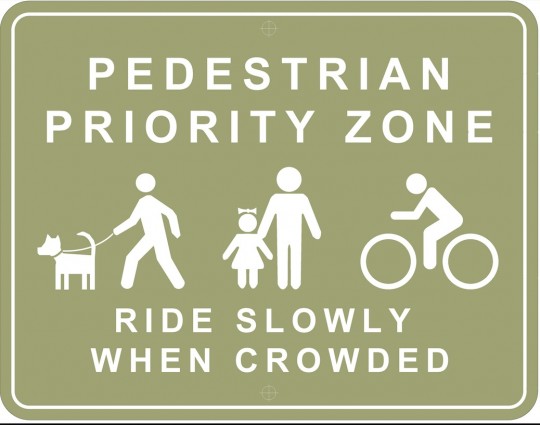
In a statement about the reason for the new signs, the Parks Bureau says:
“Shared-use environments can sometimes result in negative or unsafe interactions between cyclists, pedestrians, and other trail users. Concerns are regularly expressed to City Hall and PP&R staff about negative interactions and safety concerns, particularly regarding Waterfront Park, Eastbank Esplanade and RiverPlace trails.”
Given that issues of crowding and unsafe behaviors on this path and the Eastbank Esplanade are not new, the City is concerned that current constructions projects will make matters even worse. The combination of the Portland-Milwaukie Light Rail, Sellwood Bridge, and South Waterfront developments projects will create even more demand on these paths. Parks says the paths are already “at or over capacity during good weather.”
Parks plans to install 25 of the signs (“mainly at entrances, transition points, and known congested areas,” according to spokesman Mark Ross) tomorrow (9/18) and then monitor their effectiveness.
It will be interesting to see if mere signage will be enough to change behaviors. Most people ride on waterfront paths because they are the most direct, well-connected, and safest ways between point A and B. Naito Parkway’s old-school bike lane next to fast-moving auto traffic doesn’t provide an adequate level of safety and doesn’t as smoothly to key bridge crossings as the path does. On the east side of the river, the Esplanade is the only north-south option that doesn’t require riders to navigate the central eastside.
To really alleviate this problem, Parks and PBOT need to team up and improve bicycle access by installing a dedicated cycle path on or adjacent to Naito Parkway and on the Martin Luther King Blvd/Grand couplet on the east side.



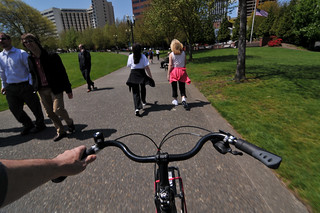
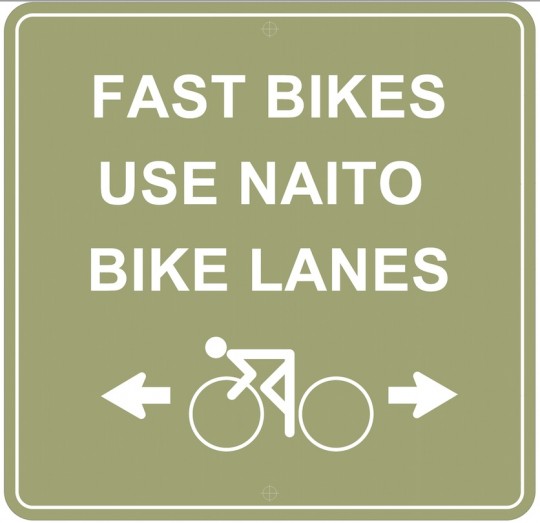
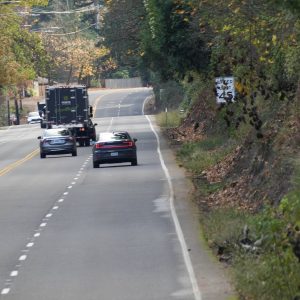
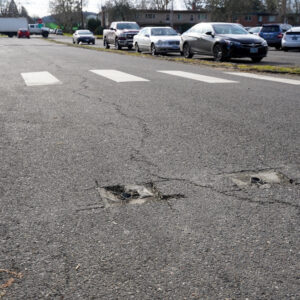
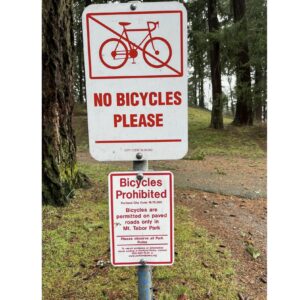
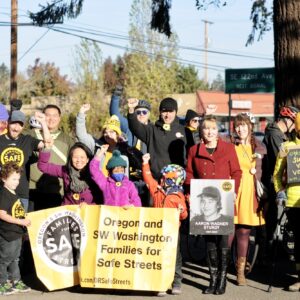
Thanks for reading.
BikePortland has served this community with independent community journalism since 2005. We rely on subscriptions from readers like you to survive. Your financial support is vital in keeping this valuable resource alive and well.
Please subscribe today to strengthen and expand our work.
Kindof insulting to think the way to solve the problem is by pushing more people into an already narrow bike lane on Naito. And don’t get me started on SB Naito, which is almost useless.
Totally agree! PP&R doesn’t get bikes or transportation! I actually appreciate theses signs EXCEPT that really is no facility that can handle the capacity and diversity using these paths
The worst thing on the waterfront are those tourist pedal cars, lets get rid of those and see how things go 😉
What? You mean you don’t absolutely love it when those 4-person surreys are blocking the narrow Steel Bridge path? What’s wrong with you?! 😉
+1 cool point for Reza!
Hmmmm. I’ve always (through what is it now, 7-8 years of daily commuting on the waterfront by bike and foot) been impressed by the level of aptitude shown by commuting/regular cyclists on the MUP. Whether it be dodging tourists, street kids, joggers with headphones, whatever – I’m not sure if I’ve ever seen an incident. I’m sure signs about the cheapest piece of infrastructure available, but in this case, I wish we didn’t even spend on them.
totally agree conceptually that fast bikes should use naito, but naito has stop lights. If your timing is bad and you respect the lights, you are a fast biker going very slowly on naito. So, in practice, the waterfront paths can be faster. I wish the waterfront paths – where wide enough – had painted lanes designating where bikes should bike and where walkers should walk. Maybe that would help with the unsafe passing a bit?
Good point. Riding around the waterfront paths that snake around Vancouver, B.C., a couple weeks back really underscored that tons of pedestrians and people on bikes definitely can all safely coexist, if the path had painted lanes advising which-mode-should-go-where. But not sure if it’s a wide enough path that they’d even consider it?
Also totally agree with the Jonathan’s main point that if infrastructure was better on Naito, there wouldn’t be so many bikes on the MUP.
I agree with you about Naito, but the path on the river’s edge will always be a place people are filtering across to get the river, I would hate to see this become more high speed or road- like. A separate bike path in the park adjacent to Naito would be good, though
Yes, the timing on those lights is terrible, and there are so many. I get so frustrated the few times I try to take Naito.
I use Naito by preference during good weather anyway because as bad as those lanes are, they feel safer than riding in the crowds in the park. So now my question is: Will I be fast enough to use Naito? Because I’m by no stretch riding a “fast bike”.
I for one promise to pass you with lots of space and care. I don’t mind anyone riding slower than me; they’re trying to get somewhere, just like I am.
Thank you Karl.
I abstain from the west AND east bank in the summer due to congestion, however, the path is still the safest way to get home or to work. The Naito lanes are a joke. Unsafe and slow. The path is faster, and I wont get run over by a truck, car, bus, etc.
If you can’t be respectful of pedestrians when biking in Waterfront Park, how can you ever expect cars to be respectful of you when you’re biking on the street?
I don’t think it is an either/or. I think I ride respectfully of the other users on Waterfront Park and I am annoyed by people who pass without ringing a bell or without enough safe distance. But just saying “get out” and not improving the quality of the alternative is a poor response to an issue which I won’t deny should be addressed (at least during the summer).
Comment of the week
One person’s respectful is another persons walk your bike. (but remember roads are for cars)
“On the east side of the river, the Esplanade is the only north-south option that doesn’t require riders to navigate the central eastside.”
Doesn’t Water Ave on the East side serve pretty much the same purpose as Naito on the West side?
Only as far north as Salmon.
Actually, you can ride Water all the way to Stark, and from there take 3rd all the way to Davis. It’s still just a standard-issue bike lane (to Stark), but fewer stop lights than Naito!
There’s no good way to connect to the Esplanade from up there. You can cross I-84 on Grand and then a left on Lloyd to the Steel Bridge or take the Burnside Bridge sidewalk and hoof your bike down a long set of stairs.
When I’m commuting from North Portland to the Central Eastside the Esplanade is the most direct (roundabout) route for me. I use two or three blocks of Water Ave.
A two-way cycle track on the east side of Naito seems like it would be awfully straightforward to put in.
Absolutely! City already owns the park, very few driveways to deal with. In fact, for a good chunk of the summer a lane or two is shut down on Naito due to festivals, saturday market, and so forth, indicating some room for lane reduction.
Good gravy yes.
This is where we get the 2-way cycle track on Naito, right? And a fix for the Naito Gap? And something useful south of the Hawthorne Bridge?
Oh…
Seriously, THAT’s the solution to this concern, not arbitrary and more one off asks of cyclists to do something weird to work around motorists or pedestrians or whatever (and the same for motorists or pedestrians, let’s actually get the systems to work with some consistency, adding disparate practices mid-way on paths makes it ultra confusing).
The solution to reducing the number of people skateboarding on handrails near businesses wasn’t to put up signs, it was to start giving them skate parks.
This is also when we move all the festivals that load in and out from Naito Parkway to, you know, someplace warm.
Even assuming the existing bike lanes remain, they really need to go at least as far south as Harrison to be a viable alternative to the waterfront.
The City keeps building more residential/mixed used north along Front Ave, how about they get ahead of the problem that is sure to come and establish some very good bike facilities parallel to the river. It seems like From the Sellwood Bridge it could go Macadam>Harbor>Naito>Front to NW Kittredge. The longer PBOT waits, the more on-street parking and frustrated business/industrial owners their will be to deal with.
Having a dedicated cycle path along the park would be nice, I would suggest that it should be a two way path on the east side of Naito, or adjacent to the mixed-use path along the sea-wall.
Putting a cycle-path along MLK/Grand would be horrible because there are intersections every block making turning vehicles a huge threat.
It would be horrible if done cheaply, and that is generally why Portland has avoided installing CT’s in the past. If we funded a proper CT on MLK/Grand, complete with phsyical separation, dedicated signals, a bike green wave, and high visibility intersection crossings, it could work out quite nicely.
In the interest of safety, the following sign should also be installed:
Park Users:
STAY TO THE RIGHT!
PAY ATTENTION!
Hang up the phone and drive! er, walk…
If you expect people to put away their phones on the Waterfront Park path or be courteous to other path users, prepare to be disappointed.
This signage is just the first step. Phone-using pedestrians are so oblivious on the path that I predict a series of serious injuries with bikes will eventually lead to bikes being banned on the path.
I have also seen 2 people in the last 2 days on their phones (1 talking on the phone, 1 doing something else, maybe looking at emails or a map). They were not “fast bikes” but could easily be the most dangerous people on bikes, which demonstrates another reason why the sign is a poor choice.
The Naito lane is more demanding to bike down than the Waterfront path mostly because of all the stopping and starting (it’s hard to catch more than 2 greens in a row). It’s also a test of patience to stop and wait for a timed light when there are no pedestrians or cars crossing the bike lane, which happens at the vast majority of red lights on Natio.
Because of this I use waterfront for my daily commute. I take it slow, but there are many bikers who don’t, which contributes to the pedestrian stress level. I’ve seen many close calls, lots of weaving cyclists taking the path like a slalom. Not good. Furthermore Waterfront is becoming a tourist hot spot, I hate that people visiting feel threatened by bikers going too fast/weaving.
I’d prefer bike speed limit signs or a no-pedestrian bike lane painted onto the waterfront path over this attempt to get people to use the inferior facility.
Ideally, we could get a two way track along Naito. I remember Hales saying Naito could get a wider bike lane at some point on the policymaker’s ride (taking out a lane of traffic). It’s a good idea, but the timed stoplights, being designed to control car-pedestrian interactions and cars turning out of downtown, hinder the bike lane’s appeal. The stop light formality should be stepped down considerably for bike-pedestrian only interactions along a hypothetical two way track.
For the bike track, I’m imagining designated pedestrian crossings with flashing lights in the track when pedestrians are present and signs instructing bikers to yield. Seems like by taking out the southbound bike lane and moving car traffic west, there would be plenty of space for a track on the east side of Natio (even more so if Hales is serious about a road diet).
Would be cool to show off a cutting edge bike facility to the visitors in the new tourist corridor.
Bonus points for extending track south along Harbor Way/Harbor Dr on the west side of Three Degrees and associated town homes down all the way to River Parkway so no one has to bike down cafe-row to get to the south waterfront.
The Naito Pkwy bike lanes are okay if you want to ride quickly. I rode them all the time when I worked in a building in that area.
If you’re not comfortable there, ride the park path – but don’t expect to ride quickly. 10 mph is fast when there are a lot of walkers on the path, and on really crowded days, getting off and walking is easier.
A dedicated bike road along the west edge of the park would be nice, but as far as downtown project priority, I’d put it well behind 2nd/3rd or some other north/south couplet in core downtown. Because there already are bike lanes on Naito, whereas there are none on most downtown core streets.
Sometimes I think the best thing would be to rip up all the concrete and put in bumpy cobblestone but this surely would affect ADA compliance.
Sometimes I like the British “ladder & tramline texture” trick where on a shared path you install on the walking side perpendicular bumps and the bicycle side longitudinal bumps. This really doesn’t help with speed and just segregates the traffic somewhat. Also, I’m guessing it has ADA implications as well.
Since the issue at The Strand (Riverfront condo owners urge bike traffic to avoid their property – UPDATED) a few years back I’ve been tinkering with an idea for a surface treatment that would not impede wheelchairs and other ADA mobility devices while discouraging high speed travel.
It is a given that no surface treatment will work on a well suspended downhill MTB rig.
We might try a wavey concrete texture. Not speed bumps but a rising and falling surface that would have little to no effect on traffic below 3-5 mph but as your speed increases it transitions to nauseating then jarring as you are continually jostled up and down anywhere from 2″-6″. A smooth textured concrete surface with a lazy sine wave profile might just be the ticket for unconsciously discouraging high speeds: wheelchair wheels still glide smoothly but high speeds become unpleasant quickly. Make high speed feel bad and people slow down without enforcement.
For the suspended bikes: aggressive street vendors that get tax breaks from PBOT for each fast bicycle they jump in front of.
Sounds neat. Would like this treatment on the roads in my neighborhood.
That’s what inspired it.
I’m sure it was intentional neglect and overuse but there was this segment of road, setup as a heavy freight access road, in Long Beach, CA (where the majority of The Port of Los Angeles’s tonnage comes in).
Due to the tonnage or a poor foundation the road had acquired a wavy profile that practically limited the speed to 15-20mph. Over that speed were… foreboding mechanical sounds and the reasonable certainty that any cargo was bouncing everywhere.
Maybe it would be cool to try this section of road in a sports car faster than 90mph, you know, if it was safe and you wouldn’t get caught.
What convinced me was the way even the most impatient LA drivers all fell in to a single speed profile without police present. For that segment of road it was as if computers were remotely limiting every vehicle’s speed. As soon as the road was better the dream was over.
This accident can be duplicated on purpose, however, just as penicillin was.
Since we’re giving way on the path, can we keep pedestrians out of the bike lane next summer?
Odd the signs are going up now.
The timing of the signs will allow for this to be a political success.
“We put up signs and it reduced congestion on the waterfront!”
…never mind the change in season doing it.
*slow clap*
The signs encourage people bicycling to ride slowly in the presence of pedestrians and to treat them with courtesy when passing (“Ride Slowly When Crowded”). Nobody is being told to get out.
Too often, people on bicycles are to pedestrians as people driving are to those who are riding: Fast. Scary. Oblivious. “No hit, no foul” is not a good guiding philosophy when bicycling in crowded conditions. People walking are regularly frightened by people on bicycles passing them fast, in close proximity ad silently. Simply take a walk on the Eastbank, the Hawthorne Bridge or Waterfront Park during rush hour to experience it. Better yet, take your 80-year old grandparent with you.
The path was not designed to accommodate the number and type of users on it today. Naito was underbuilt compared to designs we would consider today. While we will not be able to build a wider path nor shut down a travel lane on Naito next week, we can try a little education and encouragement.
If you want safer conditions for bicycling and walking in the downtown, then participate in the Central City Planning effort (https://www.portlandoregon.gov/bps/47907) and the Central City Multi-Modal Transportation Safety Project, when it starts in a year or so.
“fast bikes use naito” is definitely telling people who cycle to get out. moreover, these signs give pedestrians the impression that cyclists do not belong on mups. i expect these signs to lead to higher levels of ped-bike conflict.
4th in the USA was a very generous ranking, imo.
“will lead to”
Well said Roger. I don’t know who would want to buzz through Waterfront park when it’s crowded anyway. When I choose to go that route, I do it for the people watching, take my time, and enjoy myself. If I need to be somewhere quick, I’ll commute via the eastside esplanade which has fewer tourists.
Hawthorne Bridge can be particularly scary. I don’t understand the need to race from one place to the other via bike. Biking should be fun. Perhaps some people should consider a spinning class at the gym rather than blowing past everyone else in the narrow path of the Hawthorne Bridge.
I’ve been an advocate for speed limits on shared facilities for ages. This is a far more equitable solution than installing a sign telling “bikes [to] use Naito”. (From the perspective of a fusspot pedestrian 10 mph is “too fast”.)
It’s Kafkaesque that children are being slaughtered on east portland roads and PBOT is spending money on signs in an area that is almost certainly one of the safest places in PDX to walk or bike.
Roger,
I want signs in my neighborhood telling cars “Pedestrian Priority Zone, Drive Slowly when Crowded” and “Fast Cars Use Arterials” Surely our neighborhood streets full of kids, pets, etc sharing space with short-cutting, distracted motorists are a greater magnitude of danger than bikes on a path in a park.
here is my thinking:
The signs encourage people DRIVING to DRIVE slowly in the presence of pedestrians and to treat them with courtesy when passing (“DRIVE Slowly When Crowded”). Nobody is being told to get out.
Too often, people IN CARS ON NEIGHBORHOOD STREETS are to pedestrians as people driving are to those who are riding: Fast. Scary. Oblivious. “No hit, no foul” is not a good guiding philosophy when DRIVING in crowded conditions. People walking are regularly frightened by people IN CARS passing them fast, in close proximity and silently OR NOISILY. Simply take a walk on ANY NEIGHBORHOOD STREET AT ALMOST ANY HOUR OF THE DAY to experience it. Better yet, take your 80-year old grandparent with you.
OUR NEIGHBORHOOD RESIDENTIAL STREETS WERE not designed to accommodate the number and type of users on it today. OUR COLLECTORS AND ARTERIALS WERE underbuilt compared to designs we would consider today. While we will not be able to build SAFE< LIVABLE NEIGHBORHOOD STREETS next week, we can try a little education and encouragement.
This is the problem with MUPs. And it’s not just the cyclists, it’s the oblivious joggers w/ earbuds blasting, peds walking 3+ abreast, and the ‘travelers’ spilling out with their dogs, etc. from the benches into the path.
But I’ve also had trouble with ‘Freds’ riding too fast to control their bikes, too.
i rang my bell today
its also the oblivious bikers with earbuds.
Fix the Naito gap and I’ll never look at the waterfront path again!
Hopefully the signs are just a short-term stop-gap while the City gets funding together for separated, bi-directional bike lanes just east of Naito.
When are they going to put up the no homeless kids blocking the path signs? I have seen to many families harassed by those kids cause nobody could get through the mass of them when they start spreading out. The other day I overheard tourists saying they won’t be coming back to Portland for that very reason. They were harrased and didn’t like it.
I go to the Marina several times a week, and using Naito is not an option. I’m sure as hell not going to ride the Naito Gap, which means I would have to cross through the area of Salmon St. Fountain, which is incredibly packed with randomly-running children. And I’m riding a less-maneuverable cargo bike….
Riding Waterfront park isn’t pleasant during crowded times and signs will help only marginally. It’s a gauntlet of people who at any point could sidestep into your path. And then you have the bums and druggies that treat the park as their personal prison yard (I’ve twice collided with vagrants fighting on the sidewalk), and those bloody Surrey buggies helmed by clueless tourists (it’s really cute when they’re crossing the Hawthorne Bridge in the wrong direction).
Putting up signs is a cop-out. Pass the street fee so we can build safe routes like a Naito cycletrack that goes all the way to the Riverplace Hotel.
I wonder, do we have this same type of response/signage when people drive on neighborhood streets instead of using larger arterials/highways? Should we?
I’d love to see big signs like this on N Williams Ave targeting drivers and encouraging “fast” and/or “non-local” drivers to use MLK or I-5 instead… And then a sign that says Williams is a bike/walk or “home” zone.
I find agencies and governments have a much easier time taking this sort of stance against bicycling than they do against driving.
Just an observation.
—
I also find it troubling that bicycle riders are made to seem like the bad actors in this script when bicycling is the only mode of all involved that does not have its own, adequately safe and convenient place to operate. Walkers have priority on Waterfront Park path, drivers have priority (by design) on Naito. Bicycle riders get the double-punch of having poor facilities and then getting blamed for not behaving well. There’s something fundamentally wrong with that IMO.
A separated, bi-directional cycletrack running alongside Naito would solve a lot of these problems. It wouldn’t impinge on the land used for festivals. But it would result in the removal of several dozen very large trees.
What we need for neighborhood green way roads is something we could apply to MUPs as well: traffic calming street shapes.
In the federal design manual for roundabouts much is made of the safety such a system being incumbent upon drivers entering below a certain speed but that this must be by design. If there are two long straight streets intersecting with high speeds the approaches to the roundabout will serpentine in increasingly sharp curves to naturally slow vehicles to the roundabout’s safe functioning speed.
Such intentional curvyness and obfuscation of unobstructed sight lines are the most effective tools in slow vehicle operators, be it automotive or bicycle.
The city could start a pilot and program in small segments of the Waterfront MUP. First, verifiable speeds now to compare against later. Next, install little “social nooks” that encourage gathering along the edge. Realign the MUP pavement width to curve around these additions while retaining width. Then maybe install some hedge shrubbery at tight curves and intersections to discourage cut throughs and reduce sight lines so that traffic will have to naturally slow. Then observe and measure.
This is more expensive to retrofit than it would have been from the start but even a small segment may show measurable results.
Vancouver BC addressed this at their super-popular Stanley park by widening the path and painting lanes just for bicycles, so the pedestrians have their safe zone and bikes keep to themselves. I think in some spots they also had a lane just for boards and skates.
I hope that this signage opens up peoples minds to installing similar signage for cars on NGs. I am really surprised I don’t see any pro-quality guerrilla signage against cars on NGs.
Glad you brought that up Dmitriy. I was there in 2007 and loved how they handled this same issue. Here are two photos that show the bike/walk separation:
That’s the future of Waterfront Park.
Actually, that’s the future of South Waterfront. We borrowed heavily from the Vancouver BC design to create two pathways along the Willamette in South Waterfront. One will be 10′ for people walking and a parallel path will be 12′ for people bicycling only. There will be physical separation in between. That’s what you have to do in areas with expected high use by both modes. The rub: it takes a lot of real estate to create that.
Thanks for reminding us about that Roger. I can’t wait to see that project become a reality. Been covering it and talking about it for many years now!
http://bikeportland.org/tag/south-waterfront-greenway
And don’t you think we have plenty of real estate to do this in Waterfront Park too? Unfortunately we can’t do it on the east side until we close I-5 and reclaim it as a park too, but in Waterfront Park there’s plenty of room!
A lot of funds as well. Then there is the cultural differences. In BC the provincial insurance company can spend premiums on making roads, paths and sidewalks safer because they can measure a return on investment.
PBOT’c Can’t Do attitude once again….
I look forward to seeing this when it’s complete later this year, but it won’t be much use to anyone other than local residents, as it wont be connected to anything to the north or south.
Are there any current plans to extend the Willamette Greenway north through the Zidell / OHSU Schnitzer area, or south to Lowell and past Benz Springs?
Can we please fix the Naito Gap? 8+ years in process, already funded by ODOT, little progress on the ground. I understand it’s complicated jurisdictionally but for folks who use this route regularly, it’s insulting.
http://bikeportland.org/2007/06/22/city-working-on-fix-for-naito-gap-4149
http://bikeportland.org/tag/naito-gap
New sign language:
Attention Cyclists,
Didn’t you notice we’ve completely failed to give you adequate facilities? Seriously, back off.
I don’t condone unsafe riding, but like (nearly) everyone here, I’m at a loss for what a reasonable alternate route is. I’ll probably continue to use the waterfront, continue to ride under control and pass only when it’s safe, and continue to plead for scraps at the transportation table.
Maybe CycleLoudPDX could give Naito some love?
I would love to never have to ride my bike on the Waterfront path again.
But Naito NB is just atrocious and no way no how am I riding on it with my kids on board. (Naito SB is just pointless)
If Naito had a good cycle track from Barbur to the Steel Bridge we wouldn’t need the signs.
I think it would be great if that area was painted with lanes like the Cycle Track next to OHSU on Moody.
“Fast Bikes Use Naito Bike Lanes”. Really? REALLY?
That’s what the City offers people who are trying to commute by bike (as opposed to leisurely cruising along the Waterfront). This refers to the same bike lanes that are narrow, have frequent stormwater grates that run almost their entire width, poorly timed lights, especially at the ramp to the Morrison Bridge, and large trucks with their side mirrors hanging into the bike lane. And then, to really top things off, during the busiest times of the year, the City will put chain link fences right up to the curb or even into the bike lane itself, which forces pedestrians into the “fast bikes” lane.
I commute SB on the Waterfront path in the mornings since it’s early enough that there are very few people out. In the evenings when I’m heading NB, I’ll use the path during the coldest and rainiest months, but ride Naito most of the year.
Some days when I’m feeling lazy, especially when the cherry blossoms are blooming, I’ll ride NB on the path and know that I’ll be going slow, continually watching out for other users and occasionally having to come to a complete stop. But most days I just want to get home from work and would like to go more than 7 mph. So I ride Naito and deal with the lousy conditions. I’m already doing what the new signs tell me to do. But I wouldn’t expect the interested but concerned crowd to brave those conditions. And the City decides to ignore these conditions but try to dump even more folks into the mix.
Just wow.
“What? C’mon, you’re a bicyclist! You’ll take it—and LIKE it!”
—Parks & PBOT
It almost seems as though some think that bicyclists must thrive on adversity, and try to provide it at every opportunity. After all, if you wanted convenience, you’d be in a car.
Idea: why not recess the ship bollards? Run the ropes under ground with a steel cover. That would free up enough space for walking lanes and bike lanes.
When you consider that how much space cannot be used on Portland’s most expensive, most heavily used real estate – it makes sense to run them underground.
Would probably cost less to than caring for one more person who becomes quadriplegic after hitting the dang things….
You folks just love to send, ahem, messages to people with whom you disagree. Why can’t you see that it’s your turn now? Portland bicycle riders are almost exclusively not-from-here. There is a lot of resentment toward outsiders, in Portland, in case you hadn’t noticed. To make matters worse, Portland bicycle riders have turned my streets into a Mexican Three Ring Circus, and I do not appreciate it. Neither do the vast majority of people here, even the ones in your own Church.
I rode these streets for 30+ years. Now I’m so ashamed of other bicycle riders in my hometown, I’m too embarrassed to ride anymore.
Thanks for that.
I’ve got you beat by a few years on the important (to you) metric of “years of cycling in Portland,” and the idea of being “too embarrassed to ride anymore” is new to me.
Does everyone who jaywalks in front of traffic make you “too embarrassed to walk anymore”?
another pointless sign cluttering up the landscape telling people what they already know…
Though I long since have moved from Portland, I always loved the day that it first really rained in the fall, I called it “The first day of Waterfront Park riding season”. Enjoy!
I would love to see signs about unsafe running and walking as well.
The last thing I want to see is a separation of users on the waterfront, or on the streets.
The push, especially by cyclists and advocates, for separation is backwards thinking, and an injustice to us all.
Pigeonholed I tell you.
We will be pigeonholed, and fined for riding in exactly the places we should be riding….